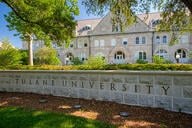You have /5 articles left.
Sign up for a free account or log in.
Job interviews at disciplinary conferences can be traumatic. There’s that awful anxiety that comes from sharing space with scores of other candidates vying for the same job. And then there’s the cost of getting there, which can be hard on a graduate student's budget.
Still, these interviews (and informal meetings and introductions) remain the best chance that some candidates may have to impress a raft of potential recruiters. But in the age of Skype, how important are these interviews, such as the ones at the annual conference of the American Political Science Association?
That question has arisen again as Hurricane Isaac forced the cancellation of the APSA’s annual conference last week in New Orleans, resulting in scores of job interviews being called off.
“Departments and individuals are in direct contact with one another to coordinate their interviews and any alternate arrangements given the cancellation of the meeting,” said a statement from the APSA. Association officials said that they were unable to say how many departments had planned to do interviews at the conference. Some departments are rescheduling interviews on Skype or telephone, while some have decided not to make alternative arrangements.
A graduate student from a private research university in the Northeast, who spoke on the condition of anonymity, said she had scheduled close to a dozen interviews for the conference. “I emailed all the schools saying I would be happy to talk via Skype, but only a third responded,” she said. “It is a little frustrating. I had researched all the search committees. For those not in the top departments, it is a chance to showcase our research and training.”
Some department chairs note that APSA interviews tend to be an early stage of the process, and so can be replaced. But they also said that a face-to-face meeting can be invaluable.
David M. Primo, director of graduate studies for the political science program at the University of Rochester, said that the political science conference is different from disciplinary meetings in economics or philosophy because it happens months earlier. “As a result, most research universities tend not to conduct formal interviews at APSA. Liberal arts and other four-year schools [colleges] are much more likely to do so,” Primo said in an email. For many liberal arts colleges, APSA is where the hiring process begins, he said.
Many research universities interview candidates based on their job applications with no “pre-interviews at APSA or through Skype," Primo said. “The cancellation of APSA may reduce the likelihood of informal meetings or advisers parading their job candidates around reception to reception, but it probably won’t make much of a difference in hiring for research universities,” he said. “And, for the job candidates, there is a belief (imparted by advisers) that it’s important to attend APSA for networking, but I have seen no evidence of an ‘APSA effect’ in this regard."
Primo's prediction: Technology and cost will eventually make the interviews obsolete.
But many political scientists continue to believe in them.
A graduate student at the University of California at Los Angeles who had five interviews scheduled for New Orleans said the interviews serve an important purpose because they give job candidates a chance to practice before they are flown out for campus interviews. “APSA happens and people go to it, and not only for the interviews,” said the graduate student, who asked not to be identified. “It is a good way of consolidating functions.”
On a web site called Political Science Job Rumors, one anonymous commenter said that the interviews gave search committees an opportunity to get a feel for the candidate pool. “But I do recall that in one search, one candidate made such a bad impression at APSA that we knew not to put him on the short list,” the commenter said.
The department chair of a research university on the West Coast who asked not to be identified said that APSA remains a great venue for job candidates to show off their wares. “They get to present their papers,” he said. “If we have our eye on someone, it is an opportunity to get to know more about them.”
Mark Miller, director of the law and society program in the political science department at Clark University, is one recruiter ruing the lost chances because of the non-conference. Miller had scheduled 31 interviews for the conference. Instead, he interviewed candidates on the phone to winnow down his list to a few who would be invited to campus.
“Although not every candidate in our candidate pool will be at the APSA conference, I prefer face-to-face interviews,” Miller said. Phone interviews tend to be the least helpful, while an interviewer may miss nonverbal clues even on Skype, he said. "I think academic conferences allow us to see how the candidates interact in person, which is something that might happen in the classroom,” Miller said. Without the face-to-face interviews, the job of a search committee becomes more difficult, he said.
R. Scott Crichlow, chair of political science at West Virginia University, said that his department will be doing interviews on Skype instead. “We’d scheduled 19 interviews for APSA, and I think we have rescheduled everyone,” he said in an e-mailed message. He called the Skype interviews a “reasonable accommodation.”
That might be so, but those job candidates keen on making an impression felt differently.
Peter Haschke, a graduate student at the University of Rochester, said that he had lost a chance to “wow and impress” because of the storm.
Haschke said he wanted to be at the APSA conference because he is very keen on a teaching job at a smaller liberal arts university. He had been scheduled to meet with professors from three search committees in New Orleans, but as of Tuesday only one of those interviews had been converted into a phone interview. “I guess political scientists cannot control the weather,” Haschke said.




